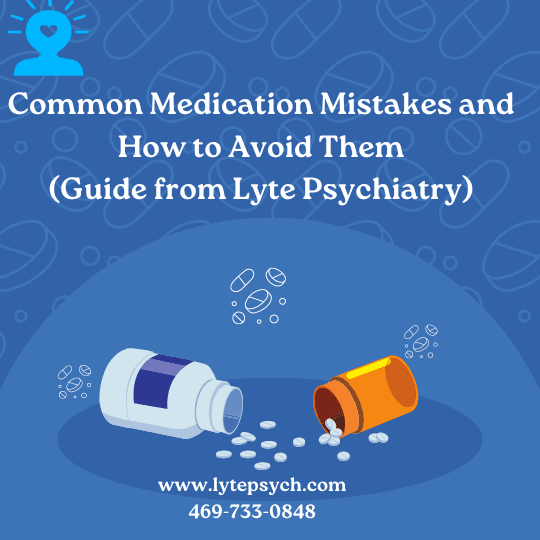Thu Apr 18 2024
5- Common Medication Mistakes and How to Avoid Them from a Psychiatrist Perspective at Lyte Psychiatry (Best Adults and Adolescents Psychiatrist and Therapist Near You), Best Psychiatrist and Therapist, Dallas, Fort Worth, TX

Avoiding Common Medication Mistakes: A Guide to Optimal Mental Health Treatment from Lyte Psychiatry (Best Psychiatrist and Therapist Near You)
Medications play a vital role in managing mental health conditions, but they must be used correctly to be effective. As experienced psychiatrists at Lyte Psychiatry, we often see patients making common medication mistakes that can compromise their treatment outcomes.
In this article, we'll discuss these mistakes and provide guidance on how to avoid them, ensuring optimal medication management for adults and adolescents seeking psychiatric care.
Introduction to Medication Management
Medication management is a psychiatric treatment, helping individuals alleviate symptoms, stabilize mood, and improve overall functioning. However, improper use of medications can lead to adverse effects and hinder progress in therapy.
As trusted psychiatrists and therapists, we strive to educate our patients about medication safety and empower them to make informed decisions about their mental health care.
Common Medication Mistakes
1. Failure to Follow Dosage Instructions
One of the most common mistakes is not adhering to the prescribed dosage regimen. Skipping doses or taking more medication than directed can disrupt the balance of chemicals in the brain and diminish the therapeutic effects of the medication.
2. Abrupt Discontinuation of Medication
Stopping medication suddenly, especially antidepressants or mood stabilizers, can trigger withdrawal symptoms and exacerbate underlying mental health conditions. It's essential to gradually taper off medications under the guidance of a psychiatrist to minimize withdrawal effects.
3. Mixing Medications Without Consulting a Healthcare Professional
Combining medications without consulting a healthcare professional can lead to dangerous drug interactions, potentially causing adverse reactions or reducing the effectiveness of treatment. Always inform your psychiatrist about any over-the-counter medications, supplements, or herbal remedies you're taking.
4. Ignoring Potential Side Effects
Ignoring or dismissing medication side effects can be harmful. Some side effects may subside over time, while others may indicate a need for dosage adjustment or a switch to a different medication. It's crucial to communicate openly with your psychiatrist about any side effects you experience.
5. Not Communicating with the Psychiatrist About Changes or Concerns
Failing to communicate changes in symptoms or concerns about medication can hinder treatment progress. Your psychiatrist relies on feedback to make informed decisions about your care. Be proactive in discussing any changes in your condition or any challenges you're facing with medication.
Impact of Medication Mistakes
The consequences of medication mistakes can be significant:
Worsening of Symptoms: Untreated or undertreated symptoms can worsen, leading to increased distress and impairment in daily functioning.
Increased Risk of Side Effects and Adverse Reactions: Improper medication use can increase the risk of side effects, adverse reactions, or even medical emergencies.
Reduced Effectiveness of Treatment: Medication mistakes can compromise the effectiveness of treatment, prolonging the duration of symptoms and delaying recovery.
How to Avoid Medication Mistakes
Follow Dosage Instructions Carefully: Always take medications as prescribed by your psychiatrist. Follow the recommended dosage and frequency, and avoid making any changes without consulting your healthcare provider.
Gradually Taper Off Medications Under Medical Supervision: If you and your psychiatrist decide to discontinue a medication, it's essential to taper off gradually to minimize withdrawal symptoms and potential relapse.
Inform the Psychiatrist About All Medications Being Taken: Provide your psychiatrist with a comprehensive list of all medications, including prescription drugs, over-the-counter medications, supplements, and herbal remedies.
Monitor and Report Any Side Effects Promptly: Pay attention to any changes in your physical or mental health while taking medication. If you experience any side effects or adverse reactions, notify your psychiatrist promptly.
Maintain Open Communication with the Psychiatrist: Effective communication is essential for successful treatment outcomes. Be open and honest with your psychiatrist about your treatment experience, including any concerns, questions, or challenges you may encounter.
Benefits of Proper Medication Management
When medications are used appropriately and in conjunction with therapy, the benefits can be profound:
Improved Symptom Control and Overall Well-being: Proper medication management can help alleviate symptoms, stabilize mood, and enhance overall functioning, leading to a better quality of life.
Minimized Risk of Relapse: By adhering to medication regimens and attending regular follow-up appointments, individuals can reduce the risk of relapse and maintain stability in their mental health.
Enhanced Quality of Life: With effective medication management, individuals can enjoy improved mental health, greater resilience, and increased participation in daily activities and social interactions.
Seek for Professional Support at Lyte Psychiatry (Best Adults and Adolescents Psychiatrist and Therapist)
If you're struggling with mental health challenges or have questions about your medication regimen, don't hesitate to seek professional help from Lyte Psychiatry. Our experienced team is dedicated to providing compassionate, personalized care to help you achieve your mental health goals.
To schedule an appointment. Click Here
To see our services. Click Here
Call us if you have questions at 469-733-0848
FAQs (Frequently Asked Questions)
Q: How do I know if I need medication for my mental health condition?
A: Your psychiatrist will conduct a comprehensive evaluation to determine if medication is appropriate for your condition.
Q: Can I stop taking my medication if I start feeling better?
A: It's essential to follow your psychiatrist's guidance regarding medication management. Stopping medication abruptly can lead to relapse or withdrawal symptoms.
Q: What should I do if I experience side effects from my medication?
A: If you experience side effects from your medication, notify your psychiatrist promptly. Your psychiatrist can adjust your dosage, switch to a different medication, or provide strategies to manage side effects effectively.
Q: How long will I need to take medication for my mental health condition?
A: The duration of medication treatment varies depending on individual factors such as diagnosis, treatment response, and ongoing symptom management.